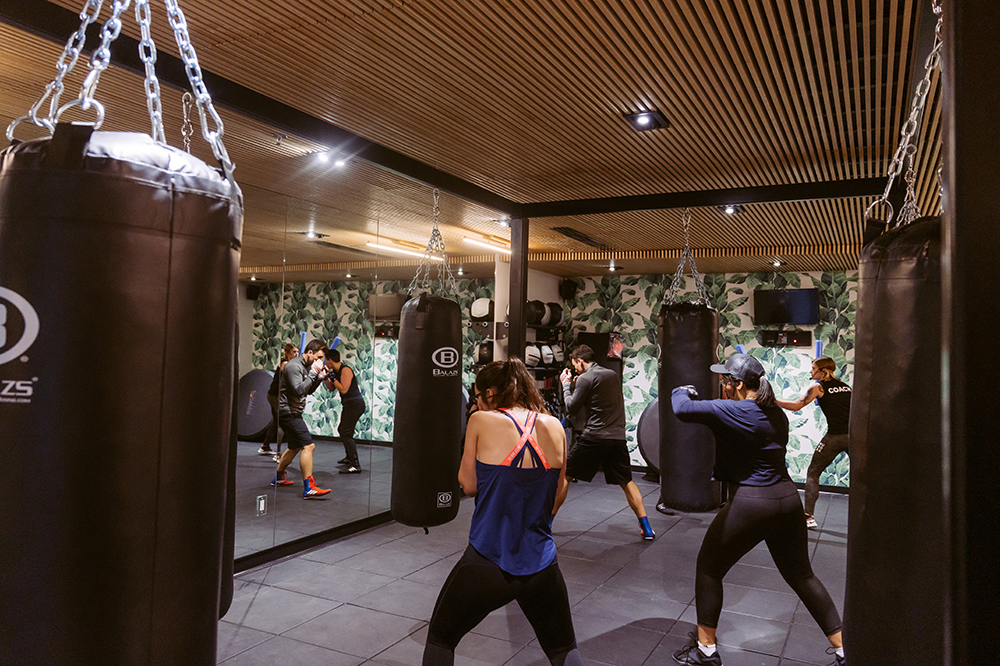Play
 Photo courtesy of Nuboxx.
Photo courtesy of Nuboxx.
Lace Up: A Boxing Guide for Beginners
September 11, 2020 @ 12:00pm
Though the art of boxing may seem intimidating at the outset, with some hard work and a good instructor it can be less challenging than it appears. More and more boxing clubs and gyms are popping up around the District, making getting started easier than ever. Whether you’re interested in boxing for fun, finding a new community, training for an amateur match or just getting fit, we’ve rounded up some need-to-know information before you get started.
History + Fun Facts
Boxing is by no means a new sport. According to the official Olympic Games website, there is evidence of boxing being practiced in Egypt around 3000 BCE. By the 7th century of the common era, boxing had been introduced in the ancient Olympic games. In the modern iteration of the Olympics, boxing was reintroduced at the 1904 games in St. Louis where the U.S. team took all of the medals for the sport. It helped that the U.S. was the only nation that had athletes competing in boxing that year.
While there was a demonstration of women’s boxing at the 1904 games, women’s boxing did not make its official Olympic debut until the 2012 games in London. The Olympic games were late in recognizing women’s boxing, as there have been official boxing matches held between women since the 19th century.
The first women’s fight to be broadcast on national television aired in 1954, with the 4-foot 11-inch Barbara Buttrick – nicknamed the “Mighty Atom of the Ring” – headlining the fight. Buttrick was a world champion in women’s boxing in the 1940s and 1950s, only ever being defeated once during the aforementioned televised match.
While Buttrick was apparently introduced to boxing by chance, plenty of women and men alike actively seek out boxing as a way to stay active and get fit outside of a traditional gym. Harvard Medical School even published a letter on the benefits of boxing in 2015, explaining that the aerobic exercise can help to lower blood pressure and reduce the risk of heart disease. The sport also promises to strengthen your bones and muscles, burn calories, and boost your mood.
From the Experts
Now that you know a bit more about the background of boxing, it’s time to get to training. District Fray spoke with the owners of two local boxing and fitness clubs in D.C. to learn more about why they love the sport and what it takes to get started.
Nuboxx
Rachel Snider is the owner and founder of Nuboxx, a high-end boutique boxing studio in D.C. The Nuboxx team prioritizes teaching techniques because while boxing is great for fitness and conditioning, it is also an art. Snider says she found boxing when she was bored of her normal routine and looking for the next best thing in fitness.
“I realized [boxing] not only [gave] me an empowering feeling afterward, but I was learning a skillset and an art,” she says. “I really wanted to do it every day.”
At Nuboxx, Snider teaches this art with a technical focus. The high sport is high intensity, but according to Snider the skills utilized are very technical and therefore require a slower teaching pace. Beginner boxers at Nuboxx start in the technical boxing class where they learn the fundamentals of throwing a proper punch. While this may sound like a very simple task, it is the basis of boxing and is the first necessary step to learning the sport. Snider emphasizes that you cannot become a boxing pro after one class.
“You can’t just do it once a month. If you come in once in a blue moon, you’re going to be starting from scratch every time you come in.”
However, regularly attending classes during a pandemic is easier said than done. At Nuboxx, the trainers had to find a way to keep athletes engaged and on top of their game when the time came for them to safely return to the mat.
“We did a lot of conditioning, which is a very important part of our program because it makes you a better boxer and a better athlete,” Snider says. “We’re not just boxing every day. We’re doing boxing and strength [conditioning]. Not using any equipment is actually beneficial because you can really work on your shadowboxing [a training method that accompanies the martial arts, used in beginner’s boxing] which is a key part of being a good boxer.”
Simply put, getting started really comes down to dedicating some of your time to practicing the techniques of boxing. Now that gyms like Nuboxx can welcome back athletes in reduced numbers, you can start lacing up your gloves and taking a hands-on approach to boxing. Gloves can range anywhere from $15 to $200 in price, while wraps usually cost less than $10. When you’re just starting a new sport, it can be hard to commit to shelling out for equipment. Snider says that, luckily, you don’t have to have your own set of equipment as soon as you step in the ring.
“[During] your first class at Nuboxx, you get a pair of wraps and we give you rental gloves so you can try them out. We do suggest that if you are going to be coming multiple times a week or really getting into the sport [that you] have multiple pairs of wraps in your arsenal and eventually buy your own gloves. It’s better to have your own equipment. They start to mold your hand better, and they become like a real customized glove. But in the beginning, you really don’t need much.”
Snider says she finds stepping into traditional boxing gyms discouraging, as you may see boxing veterans in the ring sparring one another while you are just figuring out the basics. She opened Nuboxx with the intention of getting rid of some of that pressure and creating an accepting environment.
“That whole scene is just really off-putting. I feel like you should walk into a space that doesn’t even look like a boxing gym: a beautiful, modern, welcoming space with super welcoming people [with] a ‘If you can do it, I can do it’ attitude. I built Nuboxx on the concept of leaving intimidation at the door. We try to create a family here at Nuboxx, and we want you to feel welcome.”
Learn more about all that Nuboxx has to offer by visiting www.nuboxxfitness.com. Follow them on Instagram @nuboxx to stay up-to-date with the gym. U Street location: 1449 U St. NW, DC; NOMA location: 701 Second St. NE, DC.
N-Flux
Colleen Daly is a co-owner of N-Flux, a fitness studio in D.C. specializing in martial arts and boxing, and the founder of Guerrera, a feminist fight club dedicated to promoting confidence and teaching self-defense to women and femmes. Daly began kickboxing as a way to destress, but quickly took to the sport.
“When I first moved to D.C., I was working in sexual violence prevention response, which, as you can imagine, is a really stressful job,” Daly begins. “I needed an outlet to feel confident, strong and safe in my body and just let off steam. I started taking a fitness kickboxing class with Chris Torres [N-Flux co-owner] at the Y[MCA]. I just fell in love with it and thought it was so cool.”
Daly was so into her sport, in fact, that she asked Torres to train her for an amateur match. Torres required that Daly take all of the classes he offered at the Y for a year before he trained her, and to his surprise, she did just that. Once it was clear Daly was determined to fight, she and Torres began their training in earnest. Daly explains this was a grueling process, but well worth the work.
“It’s so hard. You’re training four to six hours a day. But what I tell folks is the day of my first fight was the best day of my life, because you’re surrounded by this community [who] loves and supports you. You just feel so powerful in your body. It’s the smallest, most perfect expression of exactly who you are. There’s nothing that brings out who you are better than stepping in a ring. I loved every minute of it.”
That first experience in the ring has changed the course of Daly’s life. She became a co-owner with Torres at N-Flux, and shortly thereafter, started Guerrera. The project allows women and femmes who are interested in learning boxing or martial arts at N-Flux to have a safe space in a male-dominated industry. Daly says when she travels and trains at other clubs, the athletes are almost all men. It can be intimidating enough to join such an intense sport, and being the minority in said sport only adds to that intimidation. By allowing N-flux members to start off in a class of their peers, they can build their confidence and skills.
“I think the most important thing is to know you deserve a space on the mat. Whether you’ve been there for five minutes or five years, you deserve a space and to have the instructor give you attention, time, effort and energy. Just understanding that you deserve to be there and deserve support is really important. You’re going to get that at N-Flux because our instructors really care.”
Once you’ve gotten comfortable with your boxing community, it’s time to get comfortable with your boxing abilities. Daly, echoing Snider, stresses this is not a sport one can simply pick up and be good at. You must keep on going back to the mat and persevering to make any progress. If you don’t see immediate improvement, don’t give up on the sport as a whole. Beginner boxers should expect to be just that: beginners.
“Just be comfortable being a beginner and being comfortable not being good,” Daly explains. “You’re not going to be good for a long time. You may not even be good for a very long time. I think especially in D.C., people are such perfectionists. They’re very smart and they’ve lived their whole lives getting things very quickly. That doesn’t happen in martial arts very often. You just have to be comfortable not getting things right away.”
To learn more about the classes offered at N-Flux, visit www.staynflux.com or follow them on Instagram @staynflux. Guerrera is always open to new members. If you would like to join but need financial assistance, fill out the Guerrera scholarship application. To sponsor a Guerrera member, email [email protected]. N-Flux: 1722 I St. NW, DC; www.guerrera.fit.
Enjoy this piece? Consider becoming a member for access to our premium digital content. Support local journalism and start your membership today.







